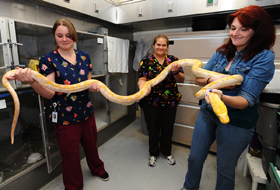Rescued python dies suddenly

WSU Veterinary medical professionals handle an 11-foot python recently adopted by the College of Veterinary Sciences.
October 15, 2013
Members of the WSU College of Veterinary Science rescued an 11-foot python on Oct. 8 that was badly burned after wrapping itself around a bathroom heater.
After an unexpected turn on Saturday, the snake died due to unknown circumstances.
“Rarely do we go and rescue an animal,” said Charlie Powell, public information officer for the college of veterinary medicine. “Only in unique cases like the snake, because we don’t have the resources.”
Renters of a Colfax house had abandoned the snake, but the veterinary school is puzzled by the death because the snake’s recovery had been going well.
“Nothing definitive at this time – the snake did show signs of dehydration and muscle wasting,” said Powell. “When you see an animal with dehydration and muscle wasting it is often a combination of insults that cascade to death.”
Nickol Finch, clinical assistant professor of zoological animal medicine and who deals with exotic animals, said, “I was a bit surprised, I thought we had her going in the right direction. The only thing she hadn’t done was eat for herself, which is normal after trauma.”
Powell said the snake’s death seemed sudden considering the treatment she was receiving.
“At the time of its death the snake was receiving food, water, subcutaneous fluids, antibiotics, in a warm place and away from anything that could have preyed upon it,” Powell said. “The death is unusual.”
The veterinary school has had success with helping snakes recover in the past. The school has nursed the animals back to life and has found new homes for them.
“This is the third snake – two boas and this python. Both previous snakes were placed in homes and we had a number of inquiries about this python,” said Powell. “There were collectors interested. I got one call all the way from Delaware from someone that was interested in her.”
While animals brought to the veterinary school benefit from the services provided by the school, the school and Washington state taxpayers completely fund the program.
“All of the cost is borne by us,” Powell said. “We did have some donations, but majority falls on the tax payers of Washington state.”
From a teaching perspective, Powell said the snake gave pathology residents the opportunity to administer antibiotics and perform a necropsy – an animal autopsy – on a large reptile.
“On the flipside, there is not a lot of call for a necropsy on big snakes,” he said.
It is not uncommon for the veterinary school to receive a request for assistance with abandoned reptiles, Powell said. Animals are either reported or law enforcement turns them in.
“Several times a year we will have exotic animals seized by law enforcement; in the past there have been two alligators and quite a few iguanas found in apartments after students leave,” he said. “There is nothing humane about releasing an animal to fend for itself.”




















